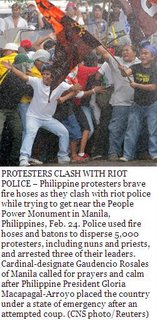UCANews
 MANILA, Philippines (UCAN) – Philippine bishops have called for sobriety, prayers and respect for civil rights after President Gloria Macapagal-Arroyo on Feb. 24 placed the country under a State of National Emergency.
MANILA, Philippines (UCAN) – Philippine bishops have called for sobriety, prayers and respect for civil rights after President Gloria Macapagal-Arroyo on Feb. 24 placed the country under a State of National Emergency.Arroyo signed Presidential Proclamation 1017 declaring the state of emergency. Addressing the nation in Filipino over television and radio, she explained that she took the step because of "clear and present danger to our republic that we have discovered and thwarted."
"There are some who tried to break from the armed forces chain of command, defy the civil government and establish a regime outside of the constitution," the president elaborated. The government would act to arrest conniving military and civilian leaders, she said, adding that those providing funds and political support to the uprising "would not be spared."
She issued the proclamation in the morning as Philippine bishops led a Mass at the Manila Cathedral honoring the outgoing nuncio to the Philippines, Archbishop Antonio Franco. After the Mass, Cardinal-elect Gaudencio Rosales of Manila called for calm, dialogue and prayers. "We are in a delicate situation now. First of all, let us pray for calm emotions, calm movements, humility," he urged.
The Manila archbishop said he understood that the government declared a state of emergency because of the threat of danger and the great temptation for opponents to use violence. Urging the opponents to "talk humbly face to face," he said nonviolence was the "essence of EDSA."
EDSA, or Epifanio De Los Santos Avenue, is where prayer vigils were held over four days in Feb. 1986 for a nonviolent resolution of an attempted coup against then-president Ferdinand Marcos, who fled the country on Feb. 25, 1986. The bishops had declared that Marcos had no moral basis to rule after winning a presidential election that month that they declared fraudulent.
For the 20th anniversary of EDSA, government officials and groups calling for Arroyo's resignation had planned separate activities and rallies around Manila Feb. 22-25. However, Metropolitan Police Director Vidal Querol announced Feb. 24 that no protest rallies would be allowed in Manila that day "to prevent any breach of peace." Police broke up a rally of some 2,000 people along EDSA and "took into custody" some of its leaders.
Nonetheless, former president Corazon Aquino proceeded to lead a scheduled rosary and prayer rally in Makati City, just south of Manila. Addressing thousands of people, she reiterated her call for Arroyo, who is accused of trying to manipulate the results of the 2004 presidential election, to make the "supreme sacrifice" and resign.
In a radio interview the same morning, Jesuit Father Joaquin Bernas, a constitutional lawyer, explained that a state of emergency does not give the president new powers. The constitution also prevents the president from suspending individuals' civil rights, including the right of assembly and street marches, he said.
The 1987 Philippine Constitution he helped draft empowers the president to call on the armed forces to prevent or suppress rebellion. In a state of emergency, the government may "temporarily take over or direct the operation of any privately owned public utility or business affected with public interest," Article 7 reads.
If rebellion or invasion is endangering the republic, the president also may suspend the privilege of the writ of habeas corpus, or place the Philippines or any part of the country under martial law for not more than 60 days.
However, the chief executive must submit a report to Congress 48 hours after martial law is proclaimed and Congress may vote to revoke or extend the proclamation. Any citizen may ask the Supreme Court to review the sufficiency of the basis for proclamation. The national charter guarantees that martial law does not suspend the constitution or give the military full jurisdiction over civilians.
Before dawn on Feb. 24, General Generoso Senga, chief of the Armed Forces of the Philippines, announced that he had relieved and taken into his custody Brigadier General Danilo Lim, commander of the First Scout Ranger Regiment, for planning to join scheduled anti-Arroyo protest rallies that day.
In a televised national defense press conference, Senga said Lim had engaged him the previous evening in conversation on various issues confronting the nation and hinted on a plan to withdraw support for the president. Senga said he later learned that Lim also had "withdrawn his support for the chain of command."
After the Mass for the departing nuncio at the cathedral in Manila, Bishop Antonio Ledesma of Ipil stressed that the bishops would never favor resorting to any kind of violence. "This will just give rise to more harm to the people later on," said the vice president of the Catholic Bishops' Conference of the Philippines. He recalled economic problems following past coup attempts.
Bishop Ledesma said the permanent council of the bishops' conference would discuss the declared state of emergency. Referring to the conference's latest pastoral statement, on Jan. 29, he said the bishops still wanted "to pursue the truth, to make sure that we restore moral values in our public life and that we abide by the constitutional process."
He described the dispersal of rallies as "unfortunate," considering they were "peaceful." In the bishop's view, these "should be allowed because that is one way for people to show their dissent in a nonviolent way."
Bishop Deogracias Iniguez of Kalookan, chairman of the bishops' public affairs committee, who also attended the Mass, told UCA News he hopes the state of emergency will be short and that civil rights will be respected. He advised the people to examine "what pushed our president to declare this emergency situation" and whether it is real. He also advised the people to get involved in the national situation and be part of the search for a solution.
This Post's Link

No comments:
Post a Comment